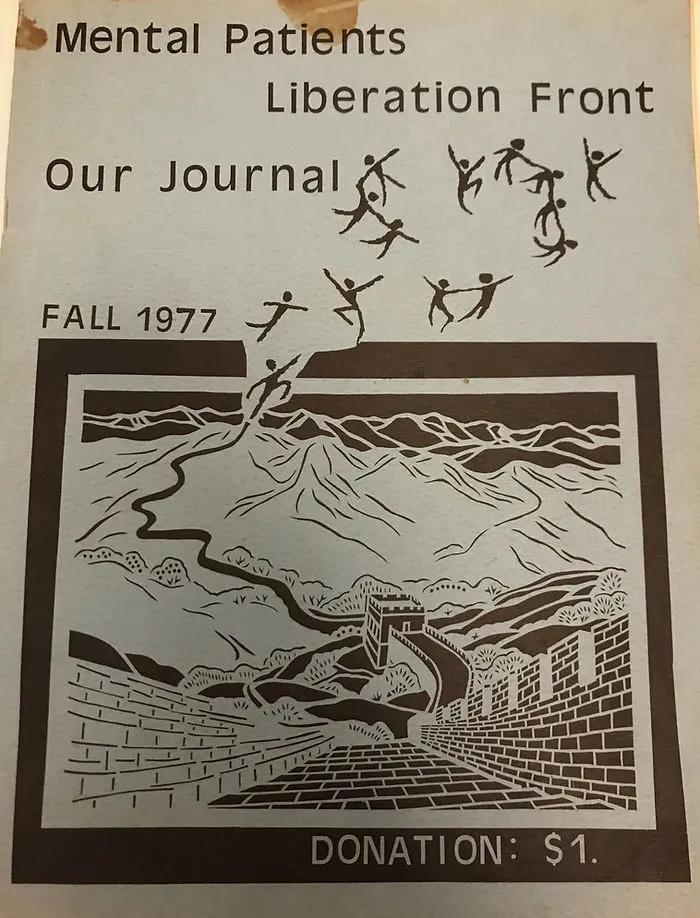"Mental Health Workers:" A text from the Mental Patients Liberation Front
*Editorial note:
The following is a transcription of an article published in the Mental Patients' Liberation Front's first issue of Our Journal from Fall, 1977. For some very brief background: the Mental Patients' Liberation Front was formed in New York in 1971, in part by members of the Insane Liberation Front, which only formally existed for about six months in 1970 in Portland. These groups were made up of psychiatric patients and ex-patients who organized around mistreatment, abuse, or neglect in the psychiatric system with the MPLF leaning more towards civil law reform (one of the most prevalent forms of mental patients activism in the US) and the ILF towards the abolition of psychiatry.
This was originally posted on the now defunct Of Unsound Mind website. I felt inspired to transcribe this on the occasion of the Minnesota Nurses Association's 2022 vote on November 30th to authorize one of the largest nurses strike's in US history for better pay, benefits, and safety conditions and the NUHW strike at Kaiser Permanente ending in October, which was the longest strike of mental health workers in US history. Though there is understandably widespread skepticism, anger, distrust, and fear from patients' organizing groups now and in the past due to the violent, ineffective, and often desultory conditions in hospitals, this article proposes that we understand the shared conditions between patients and workers and fight together.
Perhaps it's unnecessary to say so, but my transcription of this is not an endorsement of all their positions. I take particular umbrage with the idea that mental health workers "choose" their work. This is an extremely dubious claim for many reasons, the main one being that the conditions in which workers "choose" their work (capitalist social relations) are not freely chosen. Health care currently represents the largest share of US labor, particularly in areas that experienced deindustrialization (see: The Next Shift by Gabriel Winant). Calling it a "choice" among many is misguided in most cases. Had they acknowledged this, they may have come closer to seeing that race as well as gender plays a strong determining role in who gets stuck with the worst, often risky healthcare positions. Over time, this emphasis on the mental health workers' "choice" to work in the field became a truism as the North American psychiatric patient/ex-patient movement increasingly adopted hard line segregationist organizational forms that eschewed any communication across the gulf. This article represents a period of time when there was some thought being put towards the shared conditions between workers and patients that lead to abuse. I hope to see more of this kind of thought as struggles centered on health care workplaces likely increase in frequency in the near future. -Sasha
Cover of the first edition of Our Journal, the journal of the Mental Patients’ Liberation Front, from Fall 1977.
Mental Health Workers
As the mental patients' rights struggle gains momentum, patients and workers are increasingly pitted against each other. We can easily become so immersed in the specifics of individual oppression that we lose sight of the realization that hospital workers and mental patients are really on the same side of a larger struggle—that radical changes in the mental health system and generally in the whole society are in the interests of the workers as well as the patients. Just as working class white people and black people are pitted against each other in Boston to divert the attention from the real class enemies who retreat to their mansions in Wellesley and watch it all on TV, so low-paid workers and miserably oppressed mental patients are left to fight it out on the wards, while the psychiatrists and the big-wig Department officials just lay down the rules and then drive off in their Cadillacs with their fat paychecks. How many hours do the psychiatrists spend on the wards? The Superintendent? The Commissioner? Very few. It is the workers who are there day in, day out, eking out a miserable salary at a miserable job in which the only people lower in the power structure are the patients. It is no wonder that so many hospital workers become hardened to human suffering, and become perpetuators of mental patients' oppression.
And yet the reality remains that because of this hierarchy of power—because the men (rarely women) who make the rules and create the oppression remain behind-the-scenes—it is largely the hospital workers who day-to-day enforce the oppression. When four attendants are throwing you into a seclusion room, it is hard to remember that they are not really the enemy. When a nurse won't let you off the ward because you didn't do your unpaid ward job, it is hard to remember that in the long run her/his class interests are the same as yours.
To be sure, we cannot entirely overlook that they choose to work in a system which we consider malevolent. Furthermore, it is true that many workers in the mental health system have little but contempt for the patients they abuse. Although many workers ameliorate the ills of the system, they still serve that system. However, workers nonetheless are a possible avenue to change. And it would only be to our benefit if patients and workers could work together against the mental health establishment instead of the dividing line being drawn, as it is now, between the patients and all the rest of the employees.
